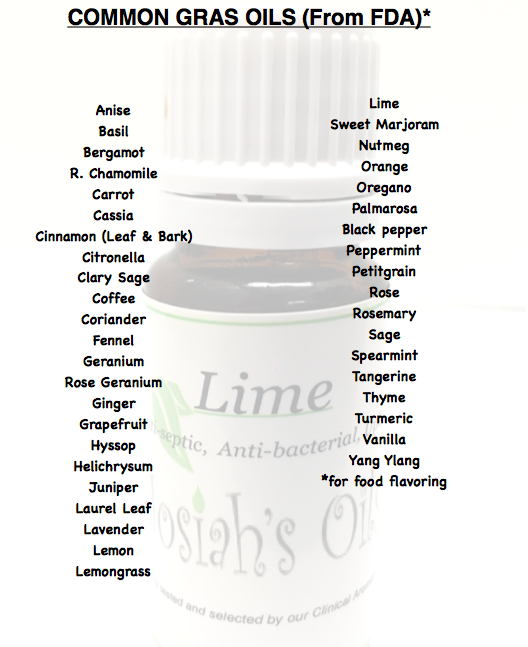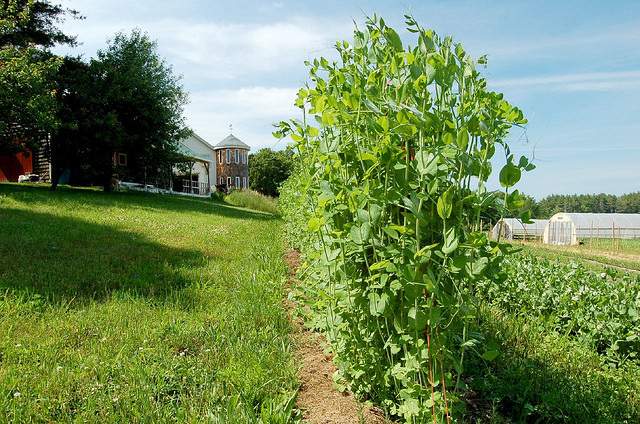|
It is very important to note that all major aromatherapy organizations do not recommend taking oils as supplements unless you are working with a trained professional. Long term damage can result to the esophagus, stomach, and liver. Internally used essential oils can also contradict medications. Essential oils need to be treated with great care. Most essential oils injuries occur when essential oils were used neat (undiluted) or when taken internally.
This is not to say you may never use some safe oils internally. Some oils have been given GRAS status by the FDA. This simply means they are “Generally Regarded as Safe.” *I note that although Hyssop is included by the FDA, I have seen reports of toxicity from that oil and I would not recommend using it internally. The FDA specifically notes that the list does not mean that the oils have been acknowledged as safe as supplements, only that they are considered safe for consumption in historic/commonly-used amounts to flavor foods. We know that many of these GRAS oils can usually be used in safe ways to enhance flavors when cooking (absent allergies or health issues). An example would be adding one or two drops of lemon essential oil to a fatty cooking oil, like coconut. After this you can add your chicken or other protein and have lemon chicken. Note, the drop or two whould be for the entire meal for a family. You can make orange chicken in a similar way. To disperse the flavor however be sure to add the essential oil to the fatty oil in your dish. These GRAs oils can also be used to make a salad dressing. Add a drop or two of grapefruit to 4-8 ounces of olive oil, then add vinegar makes a delicious salad dressing! Honey is another safe “fat” for diluting essential oils as food flavorings. Just remember with flavoring, more isn’t always better. A drop of essential oil in a few ounces of fatty cooking oil or honey usual does the trick! One of my favorite expert books on Clinical Aromatherapy, written by Jane Buckle, PhD, RN (Clinical Aromatherapy – Essential Oils in Healthcare, 2015), agrees that honey is a safer way to use essential oils internally. Indeed, Essential oils can be blended with honey water. Simply mix 1-2 drops of a GRAS essential oil (not hyssop) into 1 tsp. honey, add 6-8 ounces of warm water, and drink. Because essential oils are powerful, I would not necessarily recommend doing this every day, but perhaps from time to time after speaking to your doctor to address a specific concern, such as irritable bowels or to cleanse. Alternatively, enteric-coated gelatin capsules do not release the essential oil until they are in the small intestine. Thus, if working with a medical professional this too can provide a safer way to use essential oils internally. *Use great caution if you may be allergic to an essential oil or a constituent in an essential oil. In such a case do not use the essential oil by way of any route: inhaled, topically or internally. (Note there is a typo in the above image - Yang Ylang should read: Ylang Ylang.) Be sure to take time and learn about the potential for injuries related to misuse of essential oils. (These are commonly connected with taking oils as supplements or applying UNdiluted to the skin): http://aromatherapyunited.org/essential-oil-safety/ Ninette Jackson Josiah's Oils 8 Meadow Lane, Lancaster, PA www.josiahsoils.com --------------------------------------------------------------------------------------------------------------- Certified Clinical Aromatherapist: Ninette Jackson. Ninette has been working with essential oils for over 12 years and has undergone approximately 860 hours of study & testing to obtain her certifications. Her Aromatherapy shop, which she runs with her husband and great supporting staff, Josiah's Oils, has been in business since 2011 serving her customers with the highest quality essential oils and therapeutic blends, as well as diffusers, lotions, shampoos, conditioners, salves and more - all hand-made with Ninette's own recipes. Ninette has experience teaching about essential oils uses and purity at local libraries, chiropractors' offices, parenting groups, nursing homes, Lancaster General Hospital, PA Herb & Garden Expo, Lancaster General Rehabilitation Hospital and alternative health groups. She has contributed her expert advice regarding essential oils in the media to publications including Wellness Magazine, & LancasterOnLine, LNP (newspaper). Ninette's essential oils blends have been featured in Kiwi Magazine, Wellness Magazine, The HealthBarn USA among many others! Ninette has authored the books Essential Oils Use & Safety Guide and Essential Oil Use Guide Second Edition, which are available on Amazon and other sources. Ninette also has a Doctorate degree from Widener University and Bachelors Degree from Rowan University.
0 Comments
Leave a Reply. |
Archives
March 2022
Categories
All
|



 RSS Feed
RSS Feed